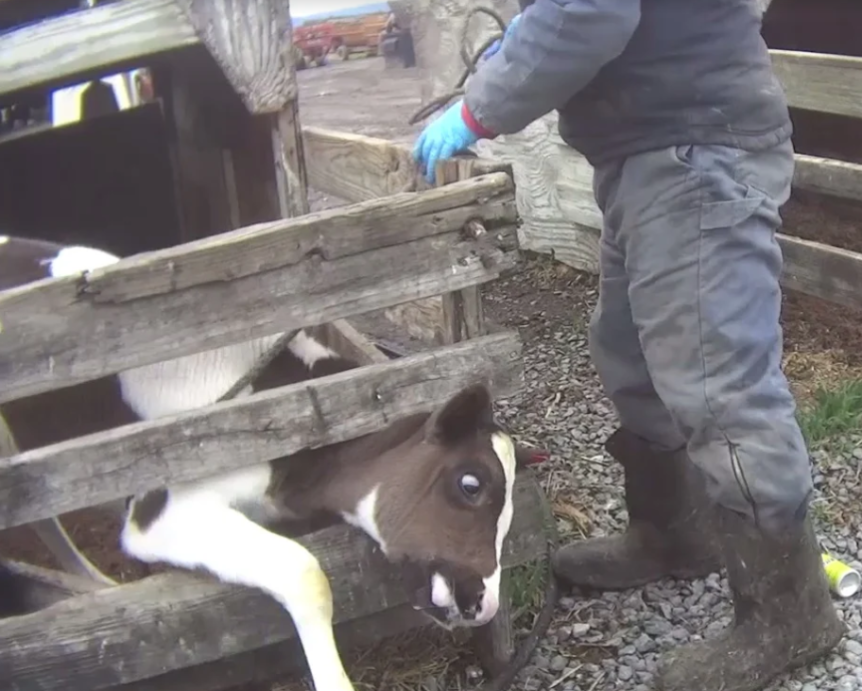- Like
- Digg
- Tumblr
- VKontakte
- Buffer
- Love This
- Odnoklassniki
- Meneame
- Blogger
- Amazon
- Yahoo Mail
- Gmail
- AOL
- Newsvine
- HackerNews
- Evernote
- MySpace
- Mail.ru
- Viadeo
- Line
- Comments
- SMS
- Viber
- Telegram
- Subscribe
- Facebook Messenger
- Kakao
- LiveJournal
- Yammer
- Edgar
- Fintel
- Mix
- Instapaper
- Copy Link
The enormous dairy industry’s taking a hit as shoppers turn away from cow’s milk. So, in an alarming move, the industry is looking to classrooms to build its consumer base.
As popularity soars for non-dairy milks like almond, soy, and oat, sales of cow’s milk reportedly plummeted to the tune of $1 billion in 2018.
So it is concerning (but unsurprising) that the dairy industry is searching for a new market by entering classrooms in the form of an “Adopt a Cow” program in elementary schools, championed by the Center for Dairy Excellence Foundation of Pennsylvania.
The “Adopt a Cow” program has made its way into the lives of over 25,000 students. The program, which any teacher can opt into, allows the class to adopt a calf and receive monthly updates “including suggestions on components of the Discover Dairy curriculum that teachers can incorporate into their lesson plans.”
Something we already know about insidious Big Dairy is that when it fails to capture the dollars of the average adult, it unloads its extra product on children. Milk and cheese have managed to become quintessential staples in schoolchildren’s diets, but not because of their nutritional value. No; despite milk being linked to rising rates of disease in children, dairy has been weaved into the American family zeitgeist by the USDA as a form of corporate welfare.
When the dairy industry has a surplus (which is almost always), the USDA funnels its products into school lunches and food assistance programs. So it comes as no surprise that this for-profit industry feels right at home entering classrooms.
But dairy has no place in school lunches, so it shouldn’t be involved in school curriculum, either.
The new program begs two very big questions: Why is a for-profit industry being effectively allowed to advertise to children in public schools, and does this program actually illuminate the truth behind dairy farming?
Well, it’s no secret that public schools and the USDA have had the back of the cruel dairy industry for years, making it easy for the industry to sneak into schools again despite the ethical dubiousness of it all.
As for the truth about dairy farming–you can bet that children in these classrooms won’t be exposed to the truth, because the reality is far too violent. Will students get to watch a live stream of their adopted calf being taken from her mother shortly after birth, breaking a meaningful bond between mother and infant? Will they follow her growth as a dairy cow, being forcibly impregnated multiple times in her life in order to continue producing milk for human consumption?
When a few years go by and she begins to produce less milk, will students be notified of their adopted cow’s painful slaughter to become a fast-food hamburger?
Even if this is not the fate of the calf in this program, it is for the average dairy cow. The truth is that even on family-run farms, like this Pennsylvania dairy farm that was recently investigated by Compassion Over Killing, gentle cows are exploited in truly horrific ways. From cruel dehorning without pain management to the killing of young male calves for veal — milk and how it’s produced is simply not school-appropriate.
Children deserve the truth, and parents deserve to know that their kids aren’t being lied to at the expense of their health and innate compassion. Together, we can resist Big Ag’s agenda by ditching dairy once and for all. For tips on how to get your family started, check out TryVeg.com’s Vegan Family Podcast.


Comments 3
I am a 5 and 6 grade reading teacher. I think my kids would get excited if we adopted a cow and could read about it. I have a webpage connected to my school – Kings mountain intermediate.
I am a 5 and 6 grade reading teacher. I think my kids would get excited if we adopted a cow and could read about it. I have a webpage connected to my school – Kings mountain intermediate. Happy reading.
Hi I’m a 4th grade teacher and my support to my students are carful for a calf Thank u